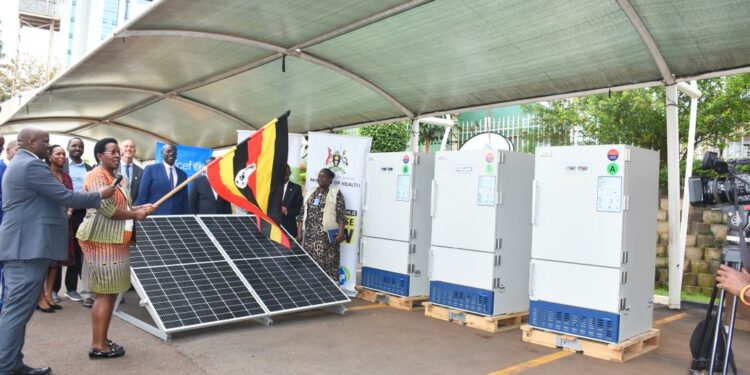On Wednesday the Ministry of Health, through the Uganda National Expanded Programme on Immunization (UNEPI), launched the second phase of its Cold Chain Equipment (CCE) distribution project, reinforcing the nation’s commitment to effective immunization and public health.
Aimed at improving immunization coverage and the efficacy of vaccines, this phase involves the dispatch of 776 refrigerators and 346 cold chain units to selected districts.
During the flagging-off ceremony, Dr. Diana Atwine, Permanent Secretary of the Ministry of Health, highlighted the importance of sustainable, reliable vaccine storage to ensure the efficacy of vaccines, reduce operational costs, and increase the accessibility of immunization services in remote areas.
“This initiative is a significant stride towards an efficient and sustainable cold chain system,” Dr. Atwine stated. “It will equip our health facilities with an effective storage infrastructure that maintains vaccine potency, prevents spoilage, and supports Uganda’s broader healthcare goals of reducing mortality rates and increasing life expectancy.”
The program is funded by GAVI and the World Bank under the Uganda COVID-19 Response and Emergency Preparedness Project (UCREPP) and supported by WHO and UNICEF. Dr. Atwine credited these partnerships as key to enabling the Ministry to expand cold chain access to even the lowest-level health centers.
By decentralizing cold storage infrastructure, the project aims to eliminate the previous challenges of transporting vaccines from central facilities over long distances, which often compromise vaccine quality due to temperature fluctuations.
UNICEF, which has been instrumental in procuring and distributing the equipment, will oversee the installation of an additional over 400 cold chain units by December, further expanding Uganda’s vaccine storage capacity. With the rollout reaching Health Center IIs and other lower-level facilities, this initiative is a critical part of maintaining an uninterrupted cold chain, particularly as Uganda expands its immunization program.
The cold chain equipment rollout addresses one of the primary challenges in vaccine administration: temperature control. Vaccines are highly sensitive to temperature changes, and without adequate storage, their efficacy can be significantly reduced.
“These cold Chain equipment are so essential because it help us to store the vaccines at the right temperatures because when you store vaccines at normal temperatures they can get spoiled and will not work, yet vaccination in this country you know has contributed to the reduction of diseases especially under five,” she said.
By maintaining the required temperatures throughout storage and transportation, the new equipment will help prevent vaccine spoilage, a critical factor in reducing diseases, particularly among children under five.
The expanded cold chain system also supports Uganda’s ambitious immunization targets, which now include vaccines for 14 diseases, with malaria vaccines recently added to the national program. The CCE program is already contributing to improved health outcomes, evidenced by declines in infant and child mortality rates and an increase in life expectancy in Uganda.
Dr. Atwine expressed gratitude to GAVI, the World Bank, WHO, and UNICEF, noting that these partnerships demonstrate a shared commitment to improving the quality of life for all Ugandans.
She commended GAVI’s continuous investment in transformative projects and acknowledged the World Bank’s flexibility in adapting to the Ministry’s needs. “We appreciate the World Bank’s readiness to meet critical gaps and collaborate with UNICEF to ensure timely, quality equipment reaches our facilities,” Dr. Atwine added.
The Ministry’s strategy to enhance Uganda’s cold chain system aligns with global public health goals, enabling more comprehensive immunization coverage. The collaboration with UNICEF ensures that Uganda’s most vulnerable communities have reliable access to life-saving vaccines, with an extended cold chain that ensures vaccines remain viable through the last mile of distribution.
Do you have a story in your community or an opinion to share with us: Email us at editorial@watchdoguganda.com










